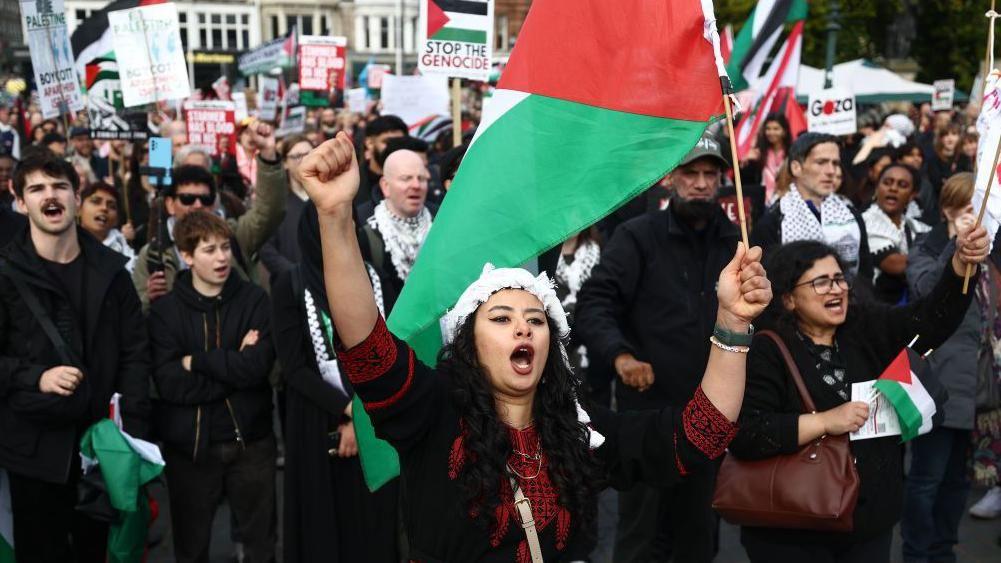This weekend, across Scotland, various events are being held to mark the one-year anniversary of the ongoing conflict in the Middle East, particularly focusing on the situation in Gaza. In the capital, Edinburgh, thousands participated in a pro-Palestinian rally, demanding an immediate ceasefire and emphasizing the human toll resulting from Israel’s military actions following the Hamas attacks on October 7 last year. Smaller gatherings were also organized in other cities like Aberdeen and Inverness, along with a vigil in Glasgow to honor victims of the Hamas assaults on Israel. The conflict erupted with a devastating attack by Hamas that resulted in approximately 1,200 deaths and the abduction of 251 individuals; presently, around 97 hostages remain unaccounted for. In response, Israel initiated a military operation in Gaza that has reportedly resulted in the deaths of at least 41,825 people, as reported by the Hamas-run health ministry.
The situation has grown more complex, with violence spreading to Lebanon in recent weeks and catalyzing significant protests throughout Scotland. In the rally in Edinburgh, pro-Palestinian demonstrators marched through the city holding flags representing both Palestine and Lebanon, uniting in their call for a ceasefire and for Britain to halt arms supplies to Israel. The rally was organized by the Stop the War Coalition, who emphasized the urgent need for a cessation of hostilities in the region. Participants like Majdi Awwad, originally from Tulkarm in the West Bank and now based in Edinburgh, expressed a sense of hope as they noticed an increasing public awareness about the ongoing conflict. Awwad’s sentiments highlight the power of solidarity and collective consciousness; he believes that even if individuals are not directly involved in the situation, their understanding can lead to greater awareness and potential solutions.
Conversely, not all attendees shared this optimism. Omar Afzal, who made the journey from Glasgow to join the protest, conveyed his fears regarding the expanding conflict, voicing concerns about the potential for regional escalation. The wider Middle Eastern conflict has indeed seen troubling developments, with the fear of a full-scale war looming. Key political figures, including Scotland’s First Minister John Swinney, have echoed calls for an immediate ceasefire and an end to the UK’s arms exports to Israel, reflecting a growing discourse on Britain’s role in the conflict. Sir Keir Starmer, the leader of the Labour Party, also emphasized the necessity of achieving a “lasting” ceasefire during recent discussions, further highlighting the urgency surrounding the humanitarian crisis.
The situation in the Middle East has escalated significantly in the past week, exacerbating fears of a broader regional conflict. The assassination of Hezbollah leader Hassan Nasrallah and Israel’s subsequent ground invasion of Lebanon have intensified tensions between countries and factions involved. In addition, Iran has reportedly launched nearly 200 ballistic missiles directed at various targets in Israel, escalating the military activity and raising alarms about the potential for a wider war. Amidst these threats, the British government has urged nationals in Lebanon to evacuate, highlighting the urgent peril faced by civilians caught in the crossfire.
As public demonstrations occur in Scotland and around the world, they serve as significant indicators of the escalating concern for humanitarian issues stemming from the ongoing violence. The calls for peace resonate with many who are deeply affected by the conflict, fueling a sense of urgency among advocates and political leaders alike. Public awareness campaigns are crucial, as attendees like Awwad believe that enabling a broader population to engage motivates them to recognize the stakes involved, while others, like Afzal, remind us of the serious repercussions and uncertainty ahead. Each of these narratives, voiced at rallies and through political discourse, contributes to an evolving conversation regarding conflict intervention and the importance of addressing the humanitarian crisis.
In addition to the continued calls for peace from various political figures, the ongoing situation prompts wider questions regarding government policies on arms exports and foreign military support. The intensifying conflict and the humanitarian toll it has taken on civilians fuel a collective urgency to reassess international relations and military strategies. Protesters and advocates are not only emphasizing the need for an immediate ceasefire but are also questioning the broader implications of military support and its consequences on global peace efforts. In this sense, Scotland’s events serve as part of a larger global movement advocating for resolution and humanitarian assistance, showcasing the importance of grassroots activism in influencing political dialogue and policies regarding the Middle East conflict.
In summary, the one-year mark of the Middle East conflict brings forth a renewed emphasis on the pressing need for peace and humanitarian intervention, as showcased by the recent events in Scotland. With thousands attending rallies and vigils, the voices advocating for a ceasefire reflect a complex interweaving of hope, concern, and political action. The evolving situation invites ongoing attention and emphasizes the critical role of awareness and advocacy in shaping future responses to humanitarian crises worldwide. As the world observes these events, it becomes evident that collective action, informed dialogue, and political accountability are crucial in addressing the myriad challenges posed by conflict and striving towards a sustainable resolution.

